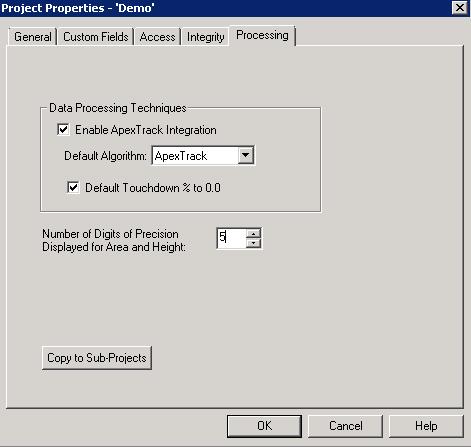Tetra Empower Agent Installation Guide (v5.3.x)
This guide describes how a system administrator can install and run Tetra Empower Agent versions 5.3.x.
To configure and use the Agent after it's installed, see the Tetra Empower Agent User Manual (v5.3.x).
UpgradesTo upgrade an Agent from a previous version, see Upgrade an Agent.
IMPORTANTThis version of the Tetra Empower Agent has changes that impact the Tetra Empower intermediate data schemas (IDS) and their parsers. Using this version of the Tetra Empower Agent with an incompatible or older version of the protocol and IDS will break your pipelines.
Please make sure that you have the compatible versions of the Tetra Empower IDS parsers and update the pipelines and processes to use the new protocols and IDS, so that pipelines continue to work as expected. For more information about the compatible IDS, protocol, and task script versions, see the Tetra Empower v5.x.x release notes.
To install and run Tetra Empower Agent v5.3.x, do the following:
- Verify the prerequisites:
- Make sure that hardware and software requirements are met
- Make sure that you have the required user account credentials
- Set up a data connection.
- Install the Tetra Empower Agent.
- Verify the installation.
- Verify the data connection:
- Verify the connection to empower
- Verify the empower group account
- Verify connection settings
- Verify injection configuration settings
- Save and start the Agent
- Verify that the Tetra Empower Agent can retrieve Empower data
For instructions, see the procedures in each of the following sections.
Important Upgrade ConsiderationsIf you're upgrading the Tetra Empower Agent from the previous version, make sure that you always back up the Agent’s SQLite database first. The Agent's SQLite database is in the following location:
<existing_empower_agent_installation>\db\applicationdb.sqlite
Step 1: Verify the Prerequisites
Hardware and Software Requirements
IMPORTANTFor the Tetra Empower Agent to automatically detect injection changes in an Empower project, the project must have Full Audit Trail enabled. This feature can only be activated when you first create an Empower project. If a project doesn't have Full Audit Trail enabled, the Agent can only process new injections, but not changes to any existing injections. For more information, see the Empower Software Audit Trails and Logs White Paper.
To install and run Tetra Empower Agent v5.3.x, the following hardware and software versions are required:
- One of the following Microsoft Windows versions:
- Microsoft Windows 10 Enterprise or Professional, 64-bit editions
- Microsoft Windows Server 2016 Standard or 2019 Standard
- .NET Framework 4.8
- 16 GB RAM minimum (64 GB RAM is recommended)
- 8 Core CPU
- 300 GB of free disk space minimum (The required disk space needs to accommodate both the project data fetched from the Empower Oracle database and the project RAW files from the Empower File System.
- Empower 3 Service Release 2 or higher Client Software (English Edition)
- If installing Empower software on an English-language computer, make sure that you confirm that the Windows region settings are configured for English (United States). The symbols for English (United States) use decimal formatting, not comma formatting, which is important when displaying numeric values (for example:
12.56, not12,56)
IMPORTANTYou must install the Tetra Empower Agent at the same workstation where the Empower 3 Client Software is running. The Tetra Empower Agent is compatible with Empower 3 Service Release 2 or higher. If the Empower 3 Client version is earlier than Service Release 2, then you must upgrade the Empower 3 Client software. For detailed system requirements, see the Client Software section in the Empower 3 System Administrator Guide.
User Account Credentials
To run Tetra Empower Agent v5.3.x, you must have the following valid user account credentials.
Empower Database User Account
The Empower Database User Account provides access to the Empower database through the Empower Toolkit and Empower libraries. The Agent does not access the Empower Oracle Database directly. Projects that can be extracted by using the Tetra Empower Agent are contingent on the access permissions granted to the User Group associated with the Empower Database User Account.
Required Permissions
For Empower v3.8.x and Higher
The Empower Database User Account's default User Type must have at least the following permissions:
- View Project Audit Trails
- View System Audit Trails
To use the Agent's Archive service and Restore feature, the account's default User Type must have the following permissions:
- View Project Audit Trails
- View System Audit Trails
- Backup Projects
- Delete Projects
- Restore Projects
- Lock Projects
- Unlock Projects
- Create Projects at root
For Empower v3.7.x and Earlier
The Empower Database User Account's default User Type must have at least View Audit Trails permissions.
To use the Agent's Archive service and Restore feature, the account's default User Type must have the following permissions:
- View Audit Trails
- Backup Projects
- Delete Projects
- Restore Projects
- Lock Projects
- Unlock Projects
- Create Projects at root
Empower Oracle TNS Names Details
Empower Oracle TNS Names details provides access to the Empower database through the Empower client (the required information can typically be found in the <Oracle Client Install folder>\\network\\admin\\tnsnames.ora file in the Oracle folder of the Empower client machine).
Oracle TNS Names Details
Oracle TNS Names Details extracts the datetime fields in a consistent ISO format.
Group User Account
The Group User Account runs the Tetra Empower Agent and accesses the Empower file server. You must ensure that the Group User Account that runs the Tetra Empower Agent is part of the Empower User Group in the Active Directory Organizational Unit, and has the same privileges as the standard Empower User, which requires read-only permissions to access the Empower RAW data on the Empower File System.
The Group User Account must also meet the following requirements from Empower and Windows:
- Windows Log on as a service permissions to run the Agent as a Windows Services program
- The date time and decimal format settings of the Group User's Windows Profile must match the settings from the current login user that's configuring the Agent
Step 2: Set Up a Data Connection
The Tetra Empower Agent generates RAW JSON files that are uploaded to the TDP either directly or through a Data Connector. Before you install the Tetra Empower Agent, you must set up the agent's data connection to the TDP by using one of the following methods:
- TDP (No Connector): Connects Agents directly to the TDP and AWS APIs, or through a proxy that you configure in the Agent host server's settings. For instructions, see TDP (No Connector) Connections.
-or-- Tetra Hub: Uses an on-premises Tetra Hub to proxy connections to TDP and AWS APIs. For instructions, see Tetra Hub Connections.
For more information, see Agent Deployment Options.
Step 3: Install the Tetra Empower Agent
TetraScience provides a Microsoft Installation Package (.msi) file to install the Tetra Empower Agent on the host server.
To get the installation package and install the Agent, do the following:
IMPORTANTTo access the server and run the installation package, you must sign in as an Administrator.
- On the host server, download the latest Empower Agent installation package from the Tetra Agent & Connector Installers page in the TetraConnect Hub. For access, see Access the TetraConnect Hub.
- Move the downloaded files to a local folder.
- Run the installer by opening the installation package and follow the guided wizard to complete the installation.
Default Installation Folder Location
C:\TetraScience\TetraScience.Agent.Empower.vx.x.x\
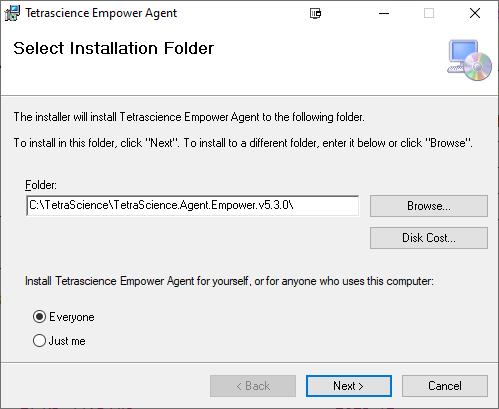
After the Agent is installed, the TetraScience Agent Empower shortcut is added to the Windows All Program Group menu. To initialize the Agent, you must add the configuration settings.
NOTETo restrict access to the local Tetra Agent Management Console, you can edit the Agent’s installation folder’s permissions to grant least privilege access. For more information, see Restrict Access to Agent Installation.
Step 4: Verify the Installation
Confirm that the Tetra Empower Agent was installed on the local drive by verifying the following:
- The TetraScience Empower Agent is installed under the
C:\\TetraSciencedirectory by default. - Under the TetraScience folder, TetraScience.Agent.Empower.v5.3.x appears.
- The following subfolders appear under the TetraScience.Agent.Empower.v5.3.x folder:
- bin
- bin64
- db
- logs
- The TetraScience folder is added to the Windows Start Menu, which includes the TetraScience Agent Empower application
NOTETo launch the TetraScience Empower Agent Management Console, select the TetraScience Agent Empower link in the Windows Start Menu.
Step 5: Verify the Data Connection
To verify that the Agent can connect to Waters Empower Software and the TDP, do the following.
Verify the Connection to Waters Empower
To verify that the Agent can connect to Waters Empower, do the following:
-
On the host server, open the Tetra Empower Agent Management Console. Then, in the left navigation menu, under Menu, choose Configuration.
-
Populate the the following fields in the Empower Database section:
- For Database Name, enter your Waters Empower Database Account.
- For User Name, enter your Waters Empower User Account.
- For Password, enter your Waters Empower User password.
- For Oracle Host Name, enter your Waters Empower Database Oracle Host Name (you can get this information from
tnsnames.orafile). - For Service Name, enter your Waters Empower Database Oracle Service Name (you can get this information from
tnsnames.orafile). - For Port, enter your Waters Empower Database Oracle Port (you can get this information from
tnsnames.orafile).
- Select Test Connection. Then, do one of the following based on if the connection test is successful or not:
- If the connection was successful, a dialog appears. Select OK to confirm the connection to the Empower system.
-or- - If the connection was not successful, then check the database account name, Empower user account credentials, and the Oracle host information. Then, repeat the steps in this section to verify the connection.
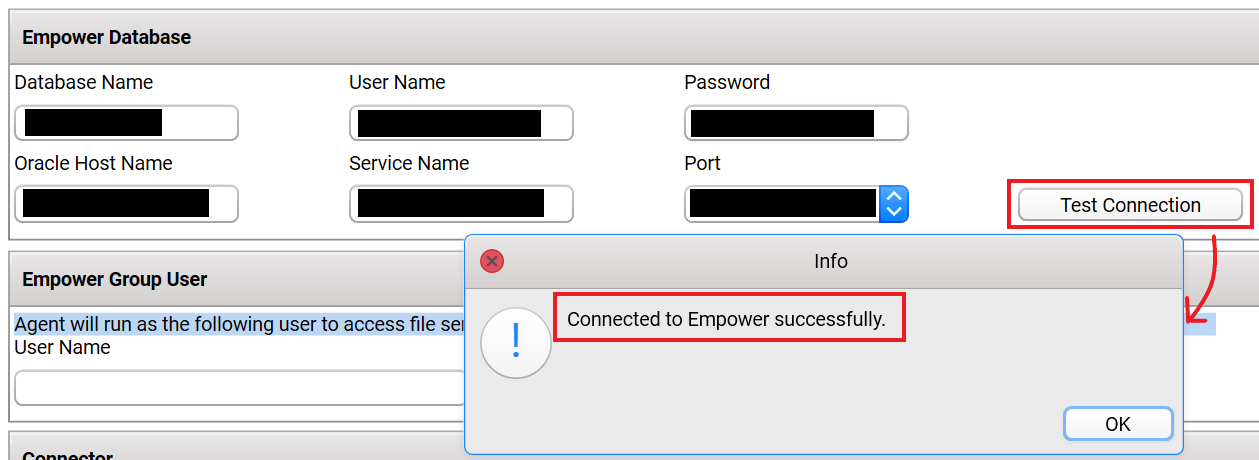
Verify the Empower Group Account
The Empower Group User is the Windows user that the Agent service runs as locally. It is recommended that you create a service user account specifically for the Tetra Empower Agent.
To verify the Empower Group Account credentials, do the following:
- On the host server, open the Tetra Empower Agent Management Console. Then, in the left navigation menu, under Menu, choose Configuration.
- For User Name, enter the Waters Empower User Group Account.
- For Password, enter the user password.
After focus leaves the password field, the Tetra Empower Agent validates the account immediately.

Verify Connector Settings
To verify that the Agent can communicate with the TDP, do the following:
- From the Tetra Empower Agent Management Console, in the left navigation menu, under Menu, choose Configuration.
- Verify that the S3 Direct Upload toggle is set to active (the default value is set to active). For more information, see S3 Direct Upload (Recommended).
- Select the Receive Commands toggle so that it's set to active (the default value is set to inactive).
- (Optional) To reset the default settings for data connection status checks and Agent log file uploads, select Advanced Settings. The Agent Configuration Advanced Settings dialog appears, which includes the following settings:
- Data Connection status check every: Indicates how often the software checks the status of the connection (heartbeat) between the TDP and the Agent. If the TDP doesn't receive a heartbeat message for more than five minutes, the TDP assumes that the Agent is offline. The default value is
30seconds. - Agent log files upload every: Indicates how often the Agent uploads log files to the Data Lake. The default value is
300seconds. - To keep the recommended settings, or to save the new values you entered, choose OK. Only consider changing these values if connection checks (heartbeat) frequency needs to be changed, or if log files need to be uploaded to the TDP at a different frequency.
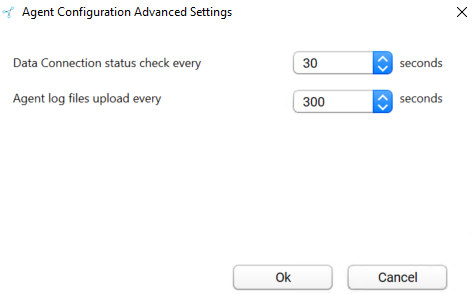
- Data Connection status check every: Indicates how often the software checks the status of the connection (heartbeat) between the TDP and the Agent. If the TDP doesn't receive a heartbeat message for more than five minutes, the TDP assumes that the Agent is offline. The default value is
- For Agent Id, enter the Agent ID (you can find this on the Agents page in the TDP).
- For the Connection Url field, enter the complete URL of the Tetra Hub, Generic Data Connector (GDC) attached to a Data Hub, or No Connector, based on your connection type.
- (For “TDP (No Connector)” setups only) If you’re using an Agent without a Connector, make sure that you do the following:
- For Org Slug, enter your organizational slug. To get your organizational slug, see Viewing Organization Details. The organizational slug is required when using a JSON Web Token (JWT). Adding the slug to this field attaches it to the Agent’s API request headers.
- For Authorization, select Add/Edit. Then, enter your JWT in the dialog that appears. To get a JWT, see Generate a JWT for a Service User. Then, choose Save to encrypt and save the JWT. The Agent validates the connection immediately and displays the updated connection status next to the Connection Url field.
- (Optional) To specify the Destination Id for allowing the files to be uploaded to the same S3 location from multiple agents. Destination Id is a UUID. This feature helps to split the load into multiple agents for scaling horizontally.
- Verify Enable Injection Service is set to Yes and Enable Archive Service is set to Yes.
After you enter the information, the Tetra Empower Agent immediately validates the connection status.
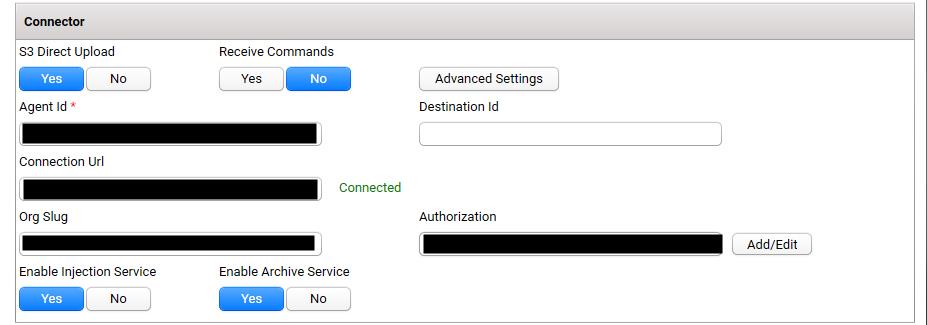
Verify Injection Configuration Settings
To confirm that the Empower Injection configuration settings, do the following:
- In the Agent Management Console, open the Configuration page.
- In the Empower Agent Output Settings section, for Output Folder, enter a valid folder path .

- In the Agent Run Time section, for Injection make sure that Upload Raw File to TDP is set to Yes.
- For Data Precision Specification, leave the default option, Empower.

Save and Start the Agent
In the Agent Management Console, select the Save button at the top of the page. Then, select the Start button and verify that the Agent Status displays as Running.
Verify that the Tetra Empower Agent Can Retrieve Empower Data
When the Tetra Empower Agent is running, you can validate the detection, generation, and upload of a Tetra Empower Agent RAW JSON file by doing the following:
- Open the Tetra Empower Agent Management Console. Then, under Menu in the left navigation menu, select Injection Service and choose Project.
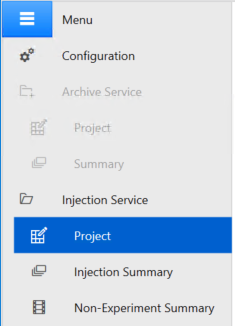
- Choose Refresh to retrieve the most recent list of Empower projects.
- From the Project list, select a test project (for example, Demo).
- Select the 3D MS Method option for the selected project. The default setting is Get3D. You can also select None or GetSpectra. To understand how this impacts the injection generation, see Tetra Empower Agent User Manual (Version 5.3.x).
- Choose Save.

IMPORTANTWhen selecting Empower as the option for Data Precision Specification, make sure that you verify the setting of Number of Digits of Precision for Area and Height in the Processing tab from Empower Project Properties.
The Agent will output the values with the specified precision.
Verify Processing Status
To check the file processing status, do the following:
- From the Tetra Empower Agent Management Console, navigate to the Injection Summary tab, and review the Tetra Empower Agent status.
- After the Agent completes its routine scan and generates the RAW file, you can validate these tasks listed in the Processing Summary section:
- Scanned Injections: Number of injections the Agent detected for the Demo project
- Generated RAW File: Number of injections the Agent retrieved for the Demo project
- Uploaded: Number of injections the Agent uploaded to the Tetra Data Platform
The count for each step listed in the Processing Summary section should match the total injection count in the Waters Empower client.
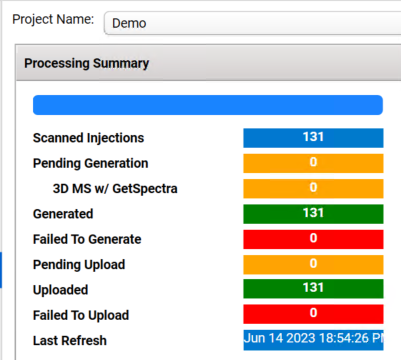
Verify That the Generated RAW Files Are Uploaded to the TDP
To confirm that the RAW files are uploaded to the TDP, do the following:
- Sign in to the TDP.
- In the left navigation menu, choose Search. A menu appears.
- From the menu, choose Search. The Search page appears.
- Check the RAW files of project Demo in the search results.
- Verify that the total number of RAW files from project Demo equals 131.

Next Steps
To configure and use the Agent after it's installed, see the Tetra Empower Agent User Manual (v5.3.x).
NOTEWhen configuring the Agent, you can use a Windows task script to automatically restart the Tetra Empower Agent each day at a specific time. This setup ensures that the Agent remains online without having to check it each day. For instructions, see Windows Scheduled Task Settings in the Tetra Empower Agent User Manual (v5.3.x).
Documentation Feedback
Do you have questions about our documentation or suggestions for how we can improve it? Start a discussion in TetraConnect Hub. For access, see Access the TetraConnect Hub.
NOTEFeedback isn't part of the official TetraScience product documentation. TetraScience doesn't warrant or make any guarantees about the feedback provided, including its accuracy, relevance, or reliability. All feedback is subject to the terms set forth in the TetraConnect Hub Community Guidelines.
Updated 3 months ago


